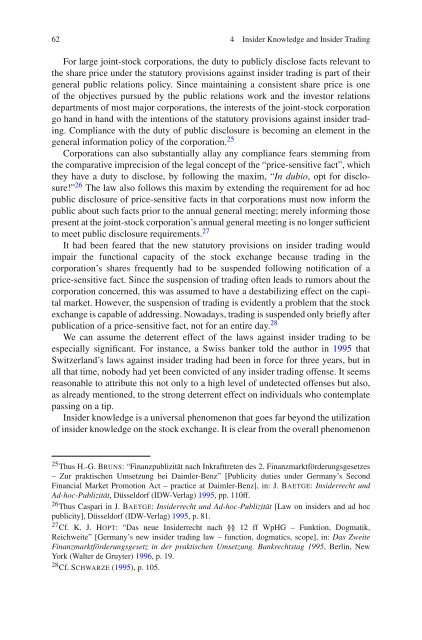The Ethics of Banking: Conclusions from the Financial Crisis (Issues ...
The Ethics of Banking: Conclusions from the Financial Crisis (Issues ...
The Ethics of Banking: Conclusions from the Financial Crisis (Issues ...
You also want an ePaper? Increase the reach of your titles
YUMPU automatically turns print PDFs into web optimized ePapers that Google loves.
62 4 Insider Knowledge and Insider Trading<br />
For large joint-stock corporations, <strong>the</strong> duty to publicly disclose facts relevant to<br />
<strong>the</strong> share price under <strong>the</strong> statutory provisions against insider trading is part <strong>of</strong> <strong>the</strong>ir<br />
general public relations policy. Since maintaining a consistent share price is one<br />
<strong>of</strong> <strong>the</strong> objectives pursued by <strong>the</strong> public relations work and <strong>the</strong> investor relations<br />
departments <strong>of</strong> most major corporations, <strong>the</strong> interests <strong>of</strong> <strong>the</strong> joint-stock corporation<br />
go hand in hand with <strong>the</strong> intentions <strong>of</strong> <strong>the</strong> statutory provisions against insider trading.<br />
Compliance with <strong>the</strong> duty <strong>of</strong> public disclosure is becoming an element in <strong>the</strong><br />
general information policy <strong>of</strong> <strong>the</strong> corporation. 25<br />
Corporations can also substantially allay any compliance fears stemming <strong>from</strong><br />
<strong>the</strong> comparative imprecision <strong>of</strong> <strong>the</strong> legal concept <strong>of</strong> <strong>the</strong> “price-sensitive fact”, which<br />
<strong>the</strong>y have a duty to disclose, by following <strong>the</strong> maxim, “In dubio, opt for disclosure!”<br />
26 <strong>The</strong> law also follows this maxim by extending <strong>the</strong> requirement for ad hoc<br />
public disclosure <strong>of</strong> price-sensitive facts in that corporations must now inform <strong>the</strong><br />
public about such facts prior to <strong>the</strong> annual general meeting; merely informing those<br />
present at <strong>the</strong> joint-stock corporation’s annual general meeting is no longer sufficient<br />
to meet public disclosure requirements. 27<br />
It had been feared that <strong>the</strong> new statutory provisions on insider trading would<br />
impair <strong>the</strong> functional capacity <strong>of</strong> <strong>the</strong> stock exchange because trading in <strong>the</strong><br />
corporation’s shares frequently had to be suspended following notification <strong>of</strong> a<br />
price-sensitive fact. Since <strong>the</strong> suspension <strong>of</strong> trading <strong>of</strong>ten leads to rumors about <strong>the</strong><br />
corporation concerned, this was assumed to have a destabilizing effect on <strong>the</strong> capital<br />
market. However, <strong>the</strong> suspension <strong>of</strong> trading is evidently a problem that <strong>the</strong> stock<br />
exchange is capable <strong>of</strong> addressing. Nowadays, trading is suspended only briefly after<br />
publication <strong>of</strong> a price-sensitive fact, not for an entire day. 28<br />
We can assume <strong>the</strong> deterrent effect <strong>of</strong> <strong>the</strong> laws against insider trading to be<br />
especially significant. For instance, a Swiss banker told <strong>the</strong> author in 1995 that<br />
Switzerland’s laws against insider trading had been in force for three years, but in<br />
all that time, nobody had yet been convicted <strong>of</strong> any insider trading <strong>of</strong>fense. It seems<br />
reasonable to attribute this not only to a high level <strong>of</strong> undetected <strong>of</strong>fenses but also,<br />
as already mentioned, to <strong>the</strong> strong deterrent effect on individuals who contemplate<br />
passing on a tip.<br />
Insider knowledge is a universal phenomenon that goes far beyond <strong>the</strong> utilization<br />
<strong>of</strong> insider knowledge on <strong>the</strong> stock exchange. It is clear <strong>from</strong> <strong>the</strong> overall phenomenon<br />
25 Thus H.-G. BRUNS: “Finanzpublizität nach Inkrafttreten des 2. Finanzmarktförderungsgesetzes<br />
– Zur praktischen Umsetzung bei Daimler-Benz” [Publicity duties under Germany’s Second<br />
<strong>Financial</strong> Market Promotion Act – practice at Daimler-Benz], in: J. BAETGE: Insiderrecht und<br />
Ad-hoc-Publizität, Düsseldorf (IDW-Verlag) 1995, pp. 110ff.<br />
26 Thus Caspari in J. BAETGE: Insiderrecht und Ad-hoc-Publizität [Law on insiders and ad hoc<br />
publicity], Düsseldorf (IDW-Verlag) 1995, p. 81.<br />
27 Cf. K. J. HOPT: “Das neue Insiderrecht nach §§ 12 ff WpHG – Funktion, Dogmatik,<br />
Reichweite” [Germany’s new insider trading law – function, dogmatics, scope], in: Das Zweite<br />
Finanzmarktförderungsgesetz in der praktischen Umsetzung. Bankrechtstag 1995, Berlin, New<br />
York (Walter de Gruyter) 1996, p. 19.<br />
28 Cf. SCHWARZE (1995), p. 105.

















